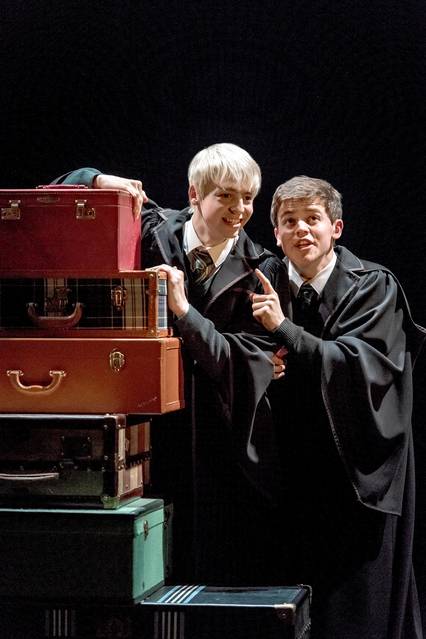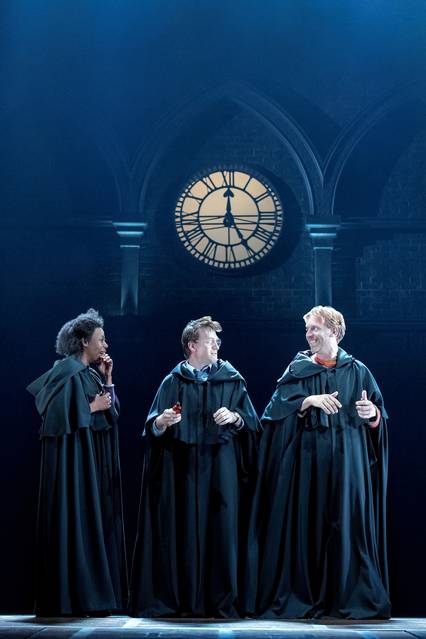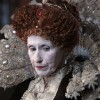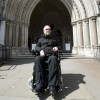‘Harry Potter and the Cursed Child, Parts One and Two’
reviewed for The Wall Street Journal, 25th July 2016
Hogwarts is full of ghosts. As always, in J.K. Rowling’s world, they’re not much help. “I am paint and memory,” warns a portrait of Albus Dumbledore ( Barry McCarthy), as a grown-up Harry Potter ( Jamie Parker) turns to him in yet another dark moment. Comforting, but not the real thing.

Anthony Boyle and Sam Clemmett
Image credit: Manuel Harlan
“Harry Potter and the Cursed Child” isn’t quite the real thing either: a nostalgic reverie for the Potter generation, devoid of Ms. Rowling’s sharpest metaphysical logic. Fans might prefer to blame playwright Jack Thorne, who wrote much of the dialogue, but his new plot was overseen by Ms. Rowling herself, with director John Tiffany. Yet thanks to the presence of some of Britain’s most talented theater makers, including Mr. Tiffany, and a bevy of heartfelt performances, the latest addition to the Potter canon makes a surprising case for the restorative power of theater. Perhaps Dumbledore was wrong to dismiss illusions. The script, to be published separately on July 31, won’t do the show justice.
The secrets of the plot have been tightly policed. And we’re treated to some of the sternest admonitions against cellphone use ever heard over a West End public address system: first from the conductor of the Hogwarts Express who warns us to behave on his magical journey, later from villainous Dolores Umbridge. Add flashy circus tricks—performers simulating a magical world—and we sometimes feel we’re at a theme park ride rather than an artistic performance. But strip away the smoke and mirrors and “Harry Potter and the Cursed Child” is, like all Ms. Rowling’s narratives, a soul-salving celebration of friendship and loyalty.
This time the firm friends are Albus Potter, second son of Harry, and Scorpius Malfoy, son—or is he?—of Harry’s old enemy Draco. As Albus, 23-year-old Sam Clemmett is a convincingly obstreperous teenager, but the breakout performance is Anthony Boyle’s turn as the lonely, dorkish Scorpius. Wry and skittish, Mr. Boyle is a lanky live wire of self-deprecation, laboring under a wig more reminiscent of the hairdo of Britain’s Boris Johnson than his aristocratic Malfoy forebears. Ms. Rowling is known for being LGBT-positive when she can be—both girls and boys, we’re told, fall for one Hogwarts stud. But both Scorpius and Albus suffer cringeworthy hetero flirtations. Scorpius has a thing for Albus’s feisty cousin Rose (Cherrelle Skeete), while Albus falls for new character Delphi Diggory, played appealingly by Esther Smith.

Noma Dumezweni, Jamie Parker and Paul Thornley.
Image credit: Manuel Harlan
The plot, spread over two plays in succession, is a mess. Albus and Scorpius undertake a relay race of repeated adventures, voyaging across time and space in search of atonement for their cursed legacies. It all renders this narrative more of a medieval romance than a modern thriller. Plot holes are pointedly explained away (“I thought the Ministry of Magic destroyed all time-turners?” “Not the illegal ones…”), but more emerge to take their place. Where each of the seven books explained and enriched the mysteries that came before, this plot feels like a series of awkward workarounds.
Another problem is that the reveal of the true villain is absurdly camp—through no fault of the actor concerned. Yet to true Potter fans, none of this is going to matter.
Mr. Tiffany’s production rises above this morass of complexity, thanks not just to Mr. Clemmett’s and Mr. Boyle’s performances, but to the emotional depth Mr. Tiffany draws out of Ms. Rowling’s first-generation characters. As Harry, Mr. Parker fleshes out every inch of our old hero: Harry’s short fuse is back—worse now that he’s parenting a teenager—alongside what his wife, Ginny (a touching Poppy Miller), calls “the best bits of you: heroic in really quiet ways.” As Hermione Granger, all grown up now and Minister for Magic, Noma Dumezweni proves herself an actress of deep grace and emotional power. Paul Thornley is the hapless, inept Ron of the film franchise, more comic relief than hero, but he does get to share with Ms. Dumezweni a moment of extraordinary bravery.
It is such moments—each packing an emotional punch—that remind us why Ms. Rowling’s books offered a moral compass to a global generation. They’re not about magic, and they’re not staged with fireworks: The scene in which Harry offers a treasured keepsake to his ungrateful, uncomprehending son is simple, disarming and heartbreaking. Meanwhile Imogen Heap’s music ramps up the tension and Mr. Tiffany’s longstanding choreographer, Steven Hoggett, sets the mood for each new adventure with a lithe ballet of Hogwarts’ students, by turns innocent and menacing. Ms. Rowling’s eye for social satire survives: The gentrification of Godric’s Hollow is a masterpiece of comic counterpoint.
The play may not be perfect. The long queue for the merchandising desk, ushered over two stories of the building, hints at a motivation beyond the purely artistic. But it is real theater, not froth. For those who grew up on—and with—Harry Potter, it will revive a powerful addiction to Ms. Rowling’s brand of poignant truth.






